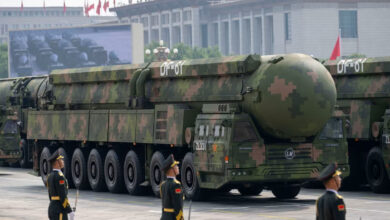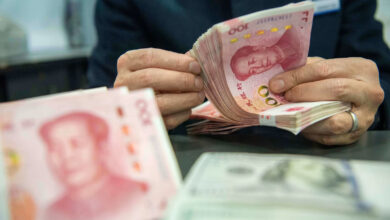HONG KONG — Chinese riot police fired tear gas to break up a protest against a planned power station on Friday while a state TV station showed confessions by two detained activists in an obvious bid to get other protesters off the streets.
Footage from Hong Kong's Cable TV showed police firing several rounds of tear gas in Haimen town in the southern boom province of Guangdong, sending hundreds of people scuttling, many covering their mouths and noses with their hands.
Hours later, a local TV station carried interviews with two detained protesters, a man surnamed Li and a woman surnamed Yung. Sitting behind bars with their heads bowed and handcuffs in full view, the two took turns to confess.
"It was wrong to surround the government and block the highway," Li said, with his eyes lowered.
"I do not know the law. If I knew, I will not block the expressway. If I could have understood this, I wouldn't have been so brash," Yung said, her voice shaking.
In an obvious bid to break up the demonstrations now running into day four, the Shantou TV station also lined up several Chinese legal experts and quoted them as saying that such actions carried a maximum penalty of five years in jail, urging protesters to surrender.
Haimen town is under the jurisdiction of Shantou city.
The protests in Haimen intensified this week just as people about 130km further along the coast, in Wukan village, called off a 10-day blockade of their village in a protest against what they said was a land grab by officials.
Latest in a growing string of protests
Protests in China have become relatively common over issues such as corruption, pollution, wages and land grabs that local-level officials justify in the name of development.
People in China are also increasingly unwilling to accept the relentless speed of urbanization and industrialization and the impact on the environment and health.
Chinese experts put the number of "mass incidents," as such protests are known, at about 90,000 a year in recent years.
While Communist Party rule is not directly threatened by such incidents of unrest, officials fear they could coalesce into broader, more organized challenges to their power.
Residents of Haimen, a coastal town of about 120,000 people, took to the streets on Tuesday to protest against plans to build a coal-fired power plant after what they complain has been years of heavy air and water pollution from existing power plants in the town.
"Villagers complained that the current power plant had led to a rise in the number of cancer patients, the deterioration of the environment, and a drop in fishing hauls," state Xinhua news agency reported on Friday.
"The Shantou city government announced Tuesday evening, shortly after the protest, that the project would be suspended.
Some village residents said that they knew nothing about the announcement, while others said they had no trust in the suspension decision."
Hong Kong newspapers reported earlier that the villagers want the project to be scrapped altogether and have pledged to keep up their action if police did not release detained protesters.
China's state news agency Xinhua had reported that police had detained five people for vandalism on Wednesday evening.




